British Prime Minister Keir Starmer has said European leaders had agreed to draw up a Ukraine peace plan to take to the United States, a vital step for Washington to be able to offer security guarantees that Kyiv says are vital to deter Russia.
At a summit in London just two days after Volodymyr Zelensky clashed with US President Donald Trump and cut short a visit to Washington, world leaders offered a strong show of support to the Ukrainian president and promised to do more to help his nation.
European leaders agreed they must spend more on defence to show Mr Trump the continent can protect itself, and with many nations struggling with already stretched public finances.
Among those in attendance at the meeting at Lancaster House were Mr Zelensky, German Chancellor Olaf Scholz and French President Emmanuel Macron.
Canadian Prime Minster Justin Trudeau also attended the meeting.
In a press conference following the summit, Mr Zelensky said Ukraine is "ready to sign the minerals deal", adding he "believes the US would be ready as well".
Regarding the row in the Oval Office on Friday, he said: "I do not think it's right when such discussions are totally open.
"The format of what happened, I don't think it brought something positive or additional to us as partners."
In an interview with France's Le Figaro newspaper, Mr Macron said France and Britain are proposing a one-month truce in Ukraine "in the air, at sea" after the talks in London.
Mr Macron said that such a truce would not, initially at least, cover ground fighting.
The problem there was it would be very difficult to check that it was being respected given the size of the front line, he said.
Peacekeepers would be deployed at a later date, he said, adding: "There won't be European troops on Ukrainian soil in the coming weeks".
Earlier Mr Starmer, who welcomed Mr Zelenskiy to Downing Street yesterday with a hug, said Britain, Ukraine, France and some other nations would form a "coalition of the willing" and draw up a peace plan to take to Mr Trump.
He did not mention which other nations, but said more countries were willing to join.
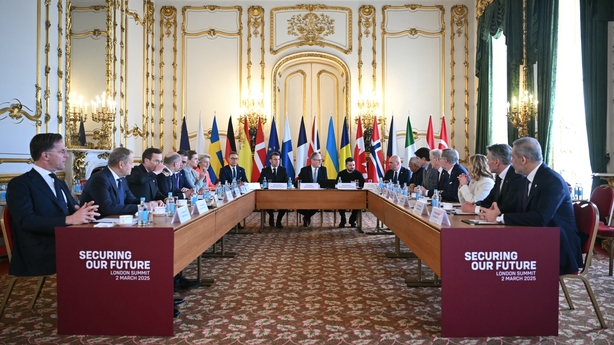
The British prime minister said that "this is a once in a generation moment for the security of Europe and we all need to step up".
He said that getting a good outcome for Ukraine is "vital to the security of every nation here and many others too".
"We are at a crossroads in history today," Mr Starmer said.
He said: "This is not a moment for more talk. It's time to act. Time to step up and lead and to unite around a new plan for a just and enduring peace."
We need your consent to load this rte-player contentWe use rte-player to manage extra content that can set cookies on your device and collect data about your activity. Please review their details and accept them to load the content.Manage Preferences
After Mr Trump's dispute with Zelensky in the Oval Office raised fears of the US pulling support for Ukraine and instead imposing a peace plan negotiated with Russia, Europe is scrambling to ensure Ukraine is not omitted from any talks.
To do so, several leaders said they must increase defence spending - something that could help bring Mr Trump on side to offer a US security guarantee in the event of peace.
"After a long time of underinvestment, it is now of utmost importance to step up the defence investment for a prolonged period of time," European Commission President Ursula von der Leyen told reporters.
"Member states need more fiscal space to do a surge in defence spending," she said, adding Europe needed to turn "Ukraine into a steel porcupine that is indigestible for potential invaders".
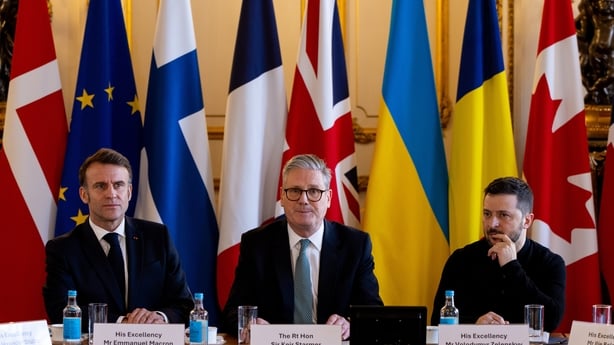
Polish Prime Minister Donald Tusk said leaders agreed Europe needed to take on more responsibility and start bearing the burden of "more spending on its defence budgets within NATO".
He added the leaders all agreed they must keep close ties with the US.
Addressing the Ukrainian president who was sat alongside him, the Mr Starmer said: "I hope you know that we are all with you and the people of Ukraine for as long as it takes. Everyone around this table."
Lacking the weaponry and depth of ammunition stocks of the US, Europe hopes to convince Mr Trump that it can defend itself, but that Russia will only adhere to a peace deal that comes with the backing of the United States.
Talks with the US have centred on Washington providing a so-called backstop for a European peacekeeping role, possibly in the form of air cover, intelligence and surveillance, and a greater as yet unspecified threat if Russian President Vladimir Putin again sought to take more territory.
But crucial to getting any agreement from Mr Trump is for European nations to increase defence spending and signal they would take part in any peacekeeping role - something Mr Starmer acknowledged was difficult to get unanimity on.
Mr Starmer increased defence spending before his visit to Washington last week and NATO Secretary General Mark Rutte said some European leaders had privately set out new plans on defence spending at the meeting, but he declined to give details.
Read more:
UK, Ukraine sign €2.7bn loan to boost Kyiv's defence capabilities
After Trump-Zelensky row, Europe must face its security options
Mr Trump has upended US policy on the three-year-old war since he returned to the White House in January, casting doubt on its military and political support for Ukraine - and Europe – alongside ending the isolation of Russia.
He had blindsided Europe by calling Mr Putin without warning and sending a delegation to Saudi Arabia for talks with Russia without including Ukraine or Europe.
Mr Trump has falsely suggested that Ukraine was responsible for starting the war and on Friday, he criticised Mr Zelensky for not being grateful for US aid.
Mr Zelensky's row with Mr Trump on Friday ended a week when Europe had appeared to be in a better position in its drive to encourage Mr Trump to continue to offer support to Ukraine after cordial visits to Washington by French President Emmanuel Macron and Mr Starmer.
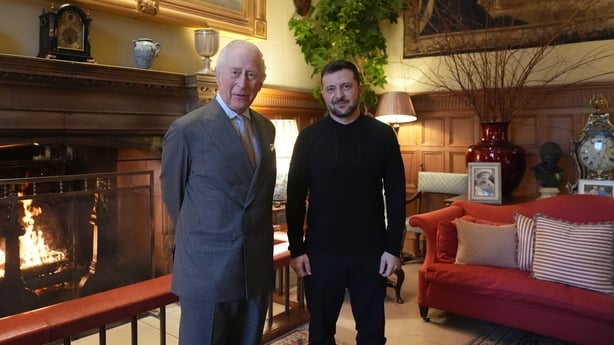
Mr Starmer described watching the row between Mr Zelensky and Mr Trump in the Oval Office as uncomfortable viewing, but was keen to push the conversation forward by offering himself as a go-between for Europe and the United States.
In a further show of support for the Ukrainian leader, Mr Zelensky later flew to meet King Charles at his private residence in eastern England.
Mr Starmer said the leaders also agreed to work to ensure Ukraine is at the table of any peace talks and boost the country's own defence capabilities.
"Europe must do the heavy lifting, but to support peace in our continent and to succeed this effort must have strong US backing," Mr Starmer told a news conference.
Read more:
UK, Ukraine sign €2.7bn loan to boost Kyiv's defence capabilities
After Trump-Zelensky row, Europe must face its security options
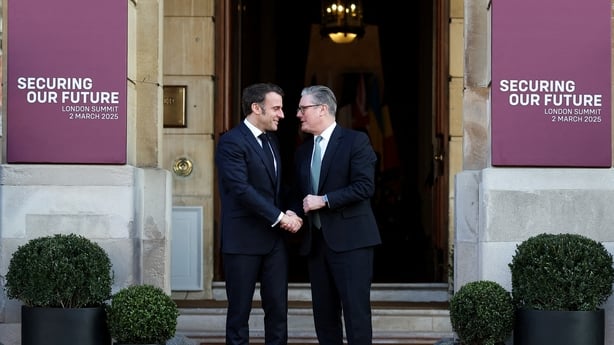
'We urgently have to rearm Europe' - von der Leyen
The European Commission chief said "we urgently have to rearm Europe".
Ms Von der Leyen said she would present a "comprehensive plan" at an EU summit on Thursday, adding "we have to have a surge in defence" and "we have to step up massively".
"It's now of utmost importance we increase spending ... it's important we prepare for the worst," she added.
The leaders had a "good and frank discussion" and talked about the need for security guarantees, said the EU chief.
Addressing US President Donald Trump, she said: "We're ready together with you to defend democracy, to defend the principle that there's a rule of law, that you cannot invade your neighbour and bully your neighbour, or you cannot change borders with force."
"It's in our common interest that we prevent future wars," she added.
Meanwhile, NATO's Mark Rutte and Polish President Andrzej Duda urged the Ukrainian leader to find a way to restore the relationship with the Trump administration.
US Republicans suggest Zelensky may have to step down
But in a sign of the still-fractious relations between the US and Ukraine, White House national security adviser Mike Waltz told CNN that the US needs a Ukrainian leader who is willing to secure a lasting peace with Russia, but that it is not clear Mr Zelensky is prepared to do so.
"We need a leader that can deal with us, eventually deal with the Russians, and end this war," National Security Advisor Mike Waltz told CNN.
"And if it becomes apparent that President Zelensky's either personal motivations or political motivations are divergent from ending the fighting in this country, then I think we have a real issue," he added.
Other Washington officials have suggested also that Mr Zelensky might have to step down if a peace deal is to be reached.
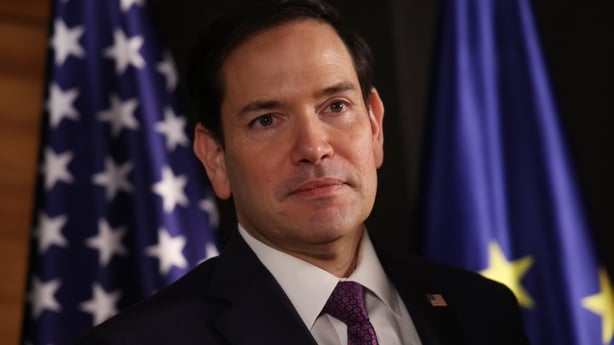
Republican Mike Johnson, speaker of the House of Representatives said: "Either he needs to come to his senses and come back to the table in gratitude, or someone else needs to lead the country to do that."
"I mean, it's up to the Ukrainians to figure that out, but ... we need President Zelensky to do what is necessary."
Senior Democrats have angrily pushed back since the row on Friday, saying Mr Trump has come dangerously close to an all-out embrace of Russia.
"The White House has become an arm of the Kremlin," said Senator Chris Murphy, a Democrat who has emerged as one of Mr Trump's most outspoken critics.
"It appears America is trying to align itself with dictators," he said on CNN.
Secretary of State Marco Rubio insisted, however, that the White House was clear-eyed about Putin's Russia.
"No one here is claiming Vladimir Putin is going to get the Nobel Peace prize this year," he said on ABC.
Mr Rubio added, however, that the first step in securing peace is to get the parties to talk together.
"You cannot end a war unless both sides come to the table," he said.
Russian Foreign Minister Sergei Lavrov also praised Mr Trump's "common sense" approach and accused European countries of seeking to prolong the conflict by propping up Mr Zelensky "with their bayonets in the form of peacekeeping units".

